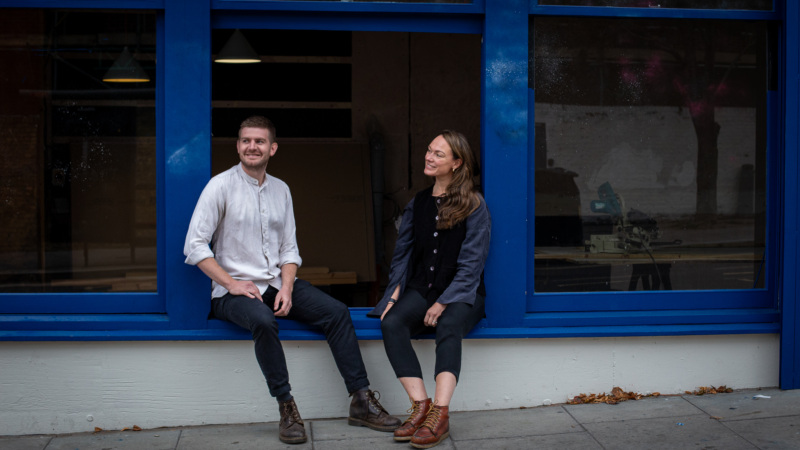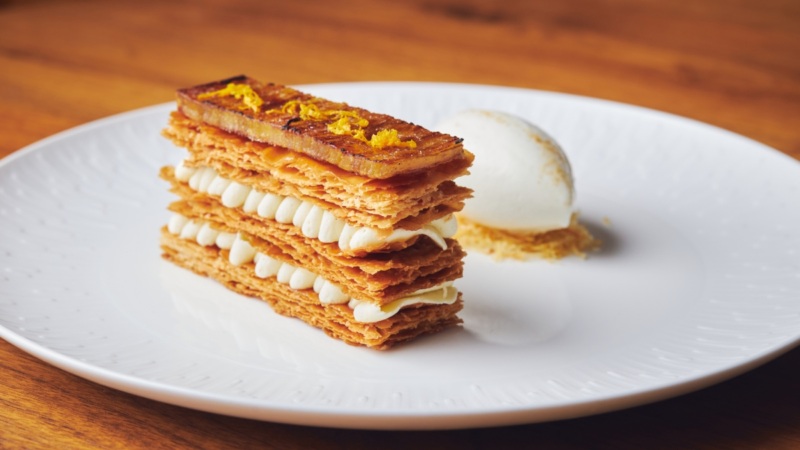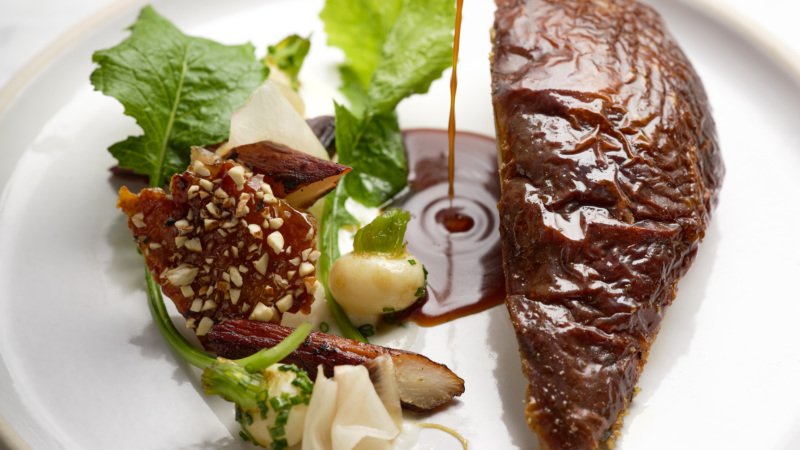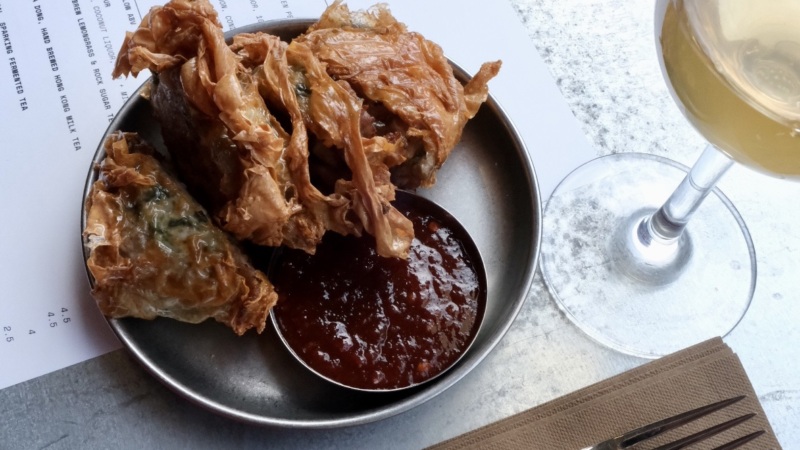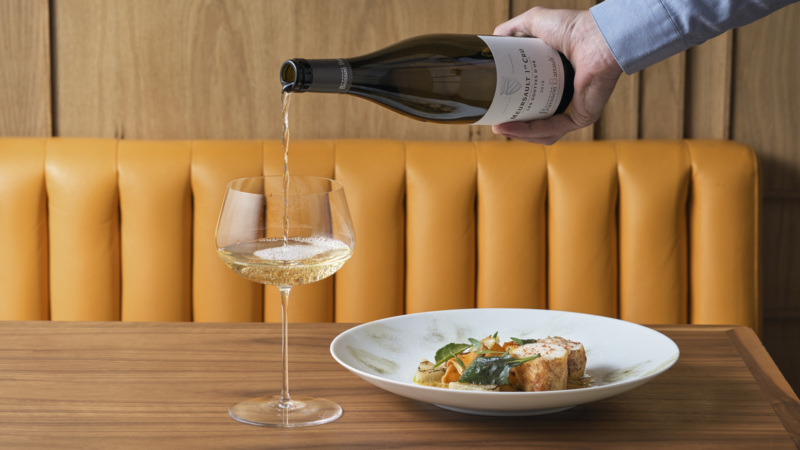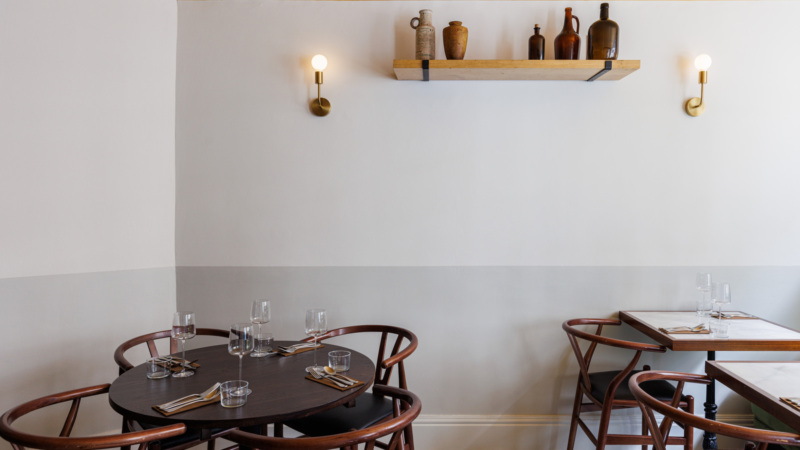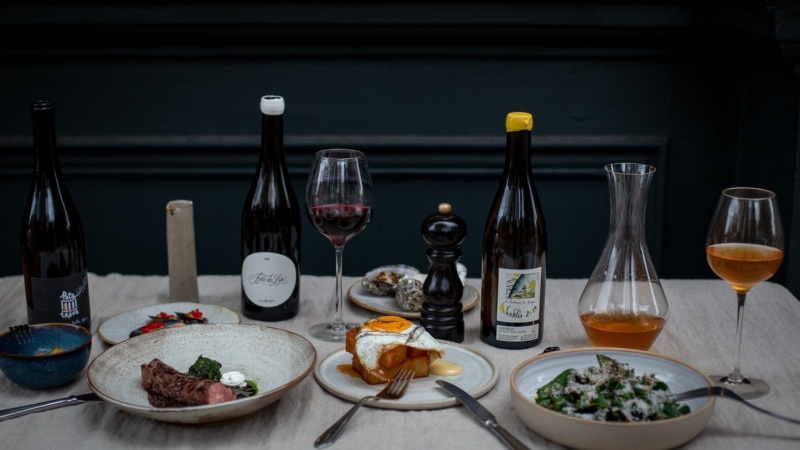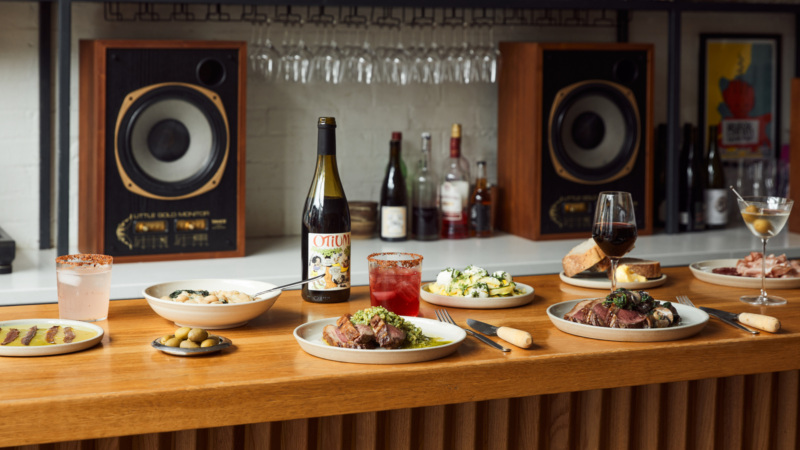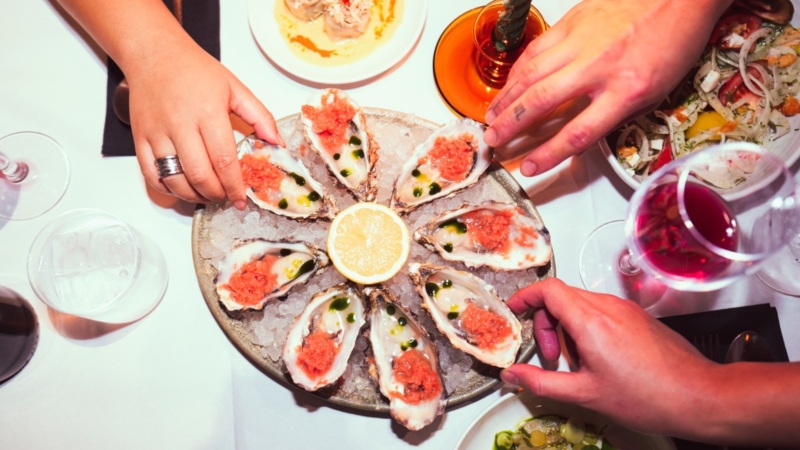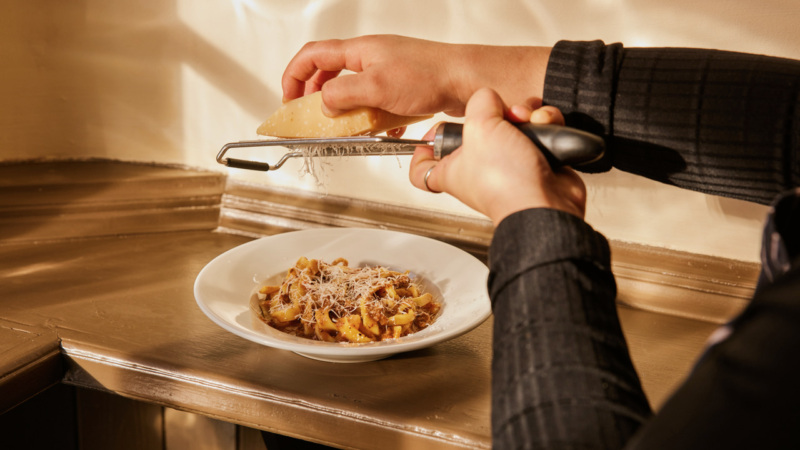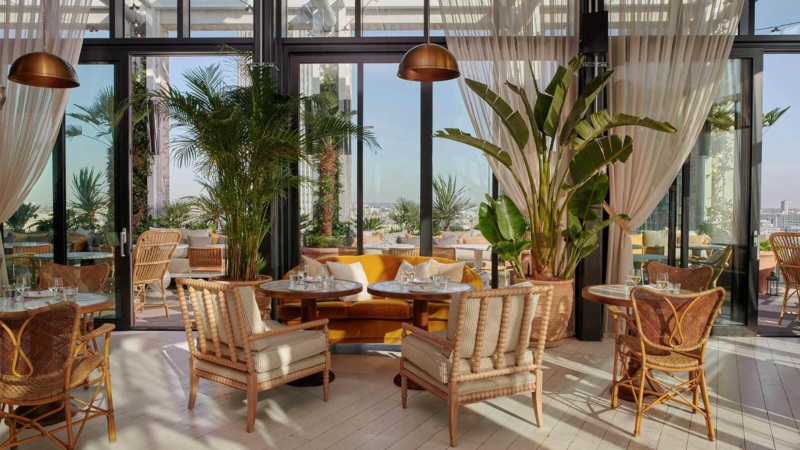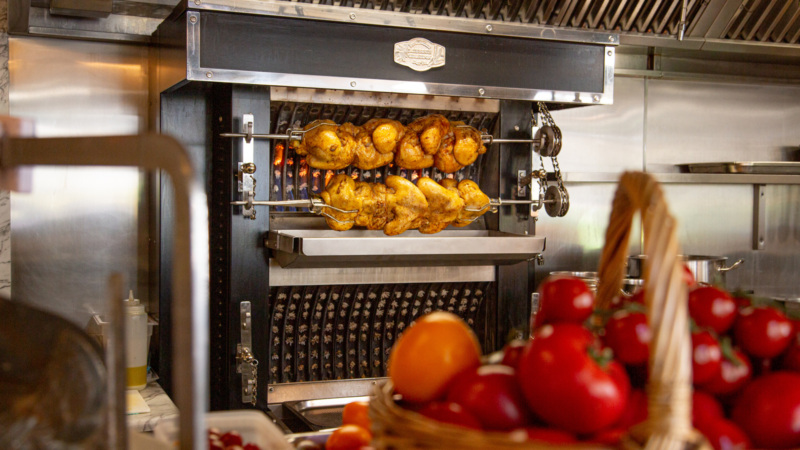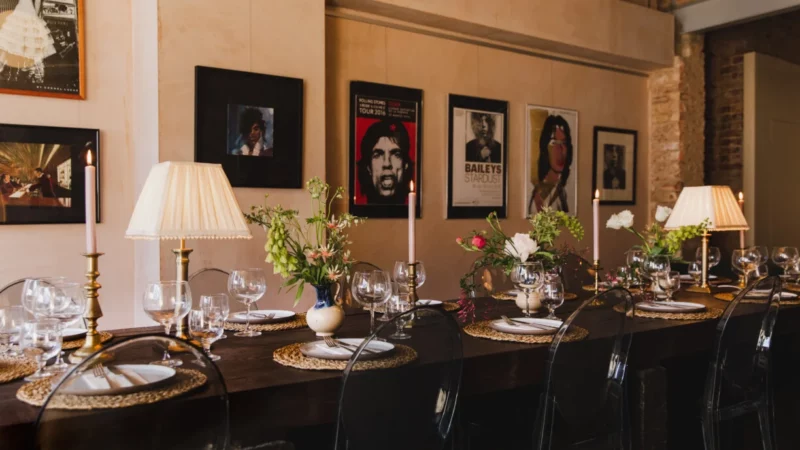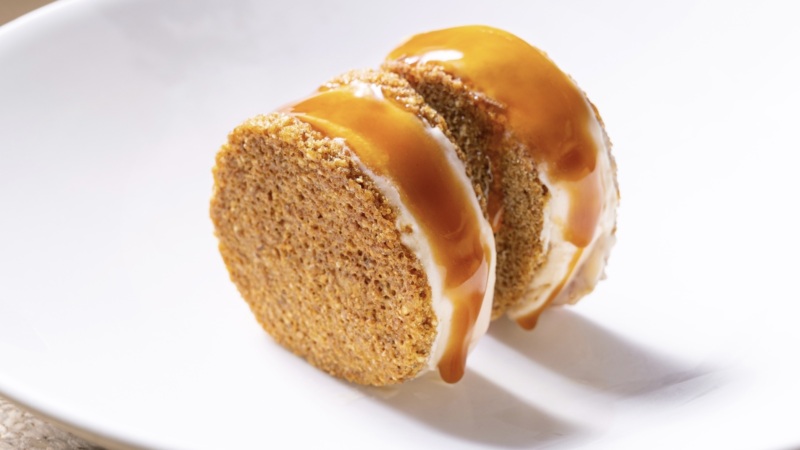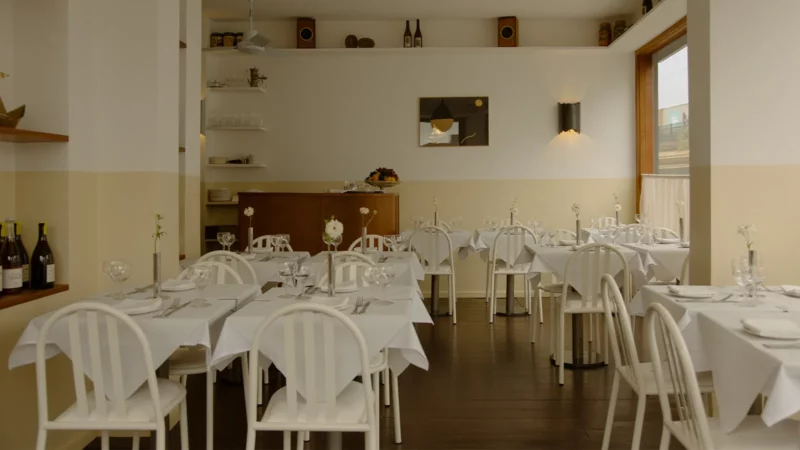
Five Things To Know About Papi, Now Open in Hackney
The twilight of youth comes for us all. And Papi, the first permanent restaurant for Charlie Carr of Wingnut Wines and Hot 4 U co-founder (and former Cub chef) Matthew Scott, represents a coming-of-age for the Hackney libertines.
The two met in 2021, while running stalls at Westgate Street Market in London Fields (“We paired some fried chicken with champagne on the first day,” Scott says). Scott spun his off into the acclaimed Hot 4 U pop-ups – at the Prince Arthur in London Fields and The Plough in Homerton – but they soon started running collaborative events, the debaucherous brouhaha of which has become part of East London lore. A year ago, they began looking for a long-term site, with a view to giving Papi some permanence. One successful £65k Kickstarter later, and they were off.
On my visit – less than a week before opening – the two-floor bolthole on Mentmore Terrace is, if not a wreck, then still demonstrably chaotic. But the ambition is palpable. Upstairs: 28 covers, a chef’s table, counter seating, light-flooded by day and a warm, filament-bulb ambience by night. “It’ll have that kind of ‘crackle’ atmosphere you get when you go into wine bars in Europe,” says Scott.
The basement will be a little moodier: a 14-cover candle-lit bar (dubbed Freddy’s), blood-red bathrooms and a tantric sex sofa below the wall of crowd-fund pledger portraits. Here’s what you need to know:


Papi’s founders have a party-party reputation – but this is not Hot 4 U 2.0
Decadence – in the maximalist flavours and preponderance for heavy boozing – was the lynchpin of Carr and Scott’s pop-ups. The bleary-eyed reputation has been perpetuated in some of Papi’s press – “maybe there was a bit of confirmation bias there”, laughs Carr of one particularly rakish feature – but a free-for-all this is not. For a start, they want Papi to become a neighbourhood institution, a fact reflected in the ten-year lease. “We want to work in harmony with the community,” Scott explains. “And be something that’s not just dictated by partying. It’s very important for us that Papi isn’t Hot 4 U. It still has the essence, but with significantly less props and organised fun.”
They’re serious about what’s in store – there’s still a whiskey luge on the cocktail menu but this is a more level-headed endeavour. “We’re hoping that [first impressions on opening] will put us into a position where we could become an institution of Hackney,” says Scott, sincerely. “A milestone for diners, for wine enthusiasts or for cocktail drinkers, or people on dates, or people who just want to pop in for coffee in the week, or that want to come in and have a little prix fixe lunch on the weekends.”
Not that they’ve thrown in the towels on their previous obligations. Hot 4 U lives, but it’s dormant – “it’s just asleep in its little box” – while Wingnut ticks over at its Netil Market shack.


The menus are a pitch-perfect blend of the past and future
The baseline remit of Papi’s food, says Scott, is one of elevated nostalgia. “Dishes that remind us of being young and happy. Something that’s familiar, but very unfamiliar, in lots of senses.” Each dish reads as a simple assemblage of esoteric ingredients, but not, they stress, served because they sound outlandish. “I think the phrase is ‘fur coat and no knickers’,” says Scott. “This isn’t that – we want things to be justified in terms of whether they’re delicious and accessible,”
Yes, there’s a retro-classic garlic bread on the carte – but it’ll be a fermented potato bread, grilled with new wild garlic and a winter citrus koshu. Veal brains – not nostalgic in a conventional sense but certainly old-school – served with Tokyo turnips and a cacio e pepe sauce. Then there’s a snack of aged-beef tartare with Hokkaido milk toast and a burger sauce made from beef garum. Irresistible stuff, and more reminiscent of Scott’s time at Cub.
The engaging, irreverent spirit is also reflected in the cocktail programme, developed by Greg Howitt of the Cub-affiliated Seed Library (both were developed and opened with bartender Ryan Chetiyawardana), with a Nesquik strawberry daiquiri and a Ribena negroni among the beer-spiked margs and rhubarb gin spritzes.
Even in a world of natural wine, the pours are fascinating – and egalitarian
Natural wine is ubiquitous in London in 2023 – but as its star has risen, so the capital’s lists have become homogeneous, steamrolled by a few key importers. It’s anathema to Carr, who likes to champion small and underrepresented vignerons. Identikit lists of high production wines, he explains, “flies in the face of the philosophy of natural wine, which is small production, almost seasonal. Stuff comes and goes – the quantities are dictated by that year in the vineyard, not by any kind of intervention to achieve certain quotas.”
To that end, he only buys bottles in minute numbers – 12 at most, normally, from smaller importers like Otros Vinos, Wines Under the Bonnet, Penzer, et al – and wants to maintain a constant turnover of what’s being poured week-to-week. Bad for returning customers wanting another drop of Vinos Ambiz’s zero-zero Airene – one of Carr’s favourites – but good for a sommelier who wants to try everything.
Crucially, he wants to strip the nerdishness out of natural wine. “If you’re coming in for a nice meal, you don’t want to hear about soil and vessel types. You want to hear about the story behind the winemaker – that human element that everyone can understand.” The pricing, too, is meritocratic: retail plus £18 on top for all bottles, whether a glou-glou chilled red for £35, or something more sipping at the loftier end of the scale.


They’re plugging zero-waste and hyper-traceable philosophies, but quietly
Papi embraces a ‘zero-waste’ credo, but they’re keen not to get bogged down in semantics. At the core, they’re simply trying to be responsible: “It’s not for a marketing purpose; it’s not for buzzwords,” says Scott. “It’s just what we do, and what we’d like to do.” Kitchen trims and offcuts will be used to make garums and ferments (or, in the finger lime husks, dehydrated and popped into cocktails), and leftover wine dregs transformed into house vinegars. Things that make both ethical and business sense: more ‘waste-not-want-not’ than an intensive, Silo-style edict, even if much of the preparatory stuff has been happening in their funky lab at the Haggerston pub on Kingsland Road.
Moreso, Scott states, Papi is about forging meaningful relationships with producers and maintaining a focus on seasonality, localism (their suppliers are largely found around the top cap of outer London) and food-chain traceability. They’ll be sourcing meat from the Ethical Butcher and ex-dairy-cow specialists Mr Txuleta. Seafood from Henderson’s. Fruit and vegetables from Shrub, an umbrella supplier of 25 regenerative and low-impact farms with a collated list of products in thrall to the seasons.
Fortunately, Papi is launching at a time when the drudgery of the winter months gives way to the fragrant new-season verdancy of asparagus, wild garlic, purple-sprouting broccoli, and so on. “All the stuff that you’re inevitably going to see on every menu from Noble Rot to Brawn to P Franco to Bright,” says Scott. “That’s really exciting for us.”
Tom Howells is a London-based writer and editor. Follow him on Instagram and Twitter. Follow Resy, too.


